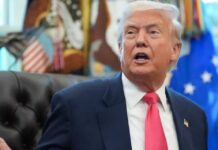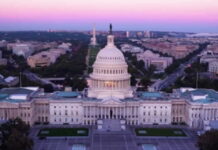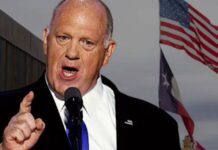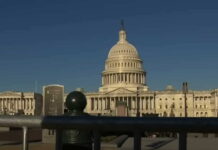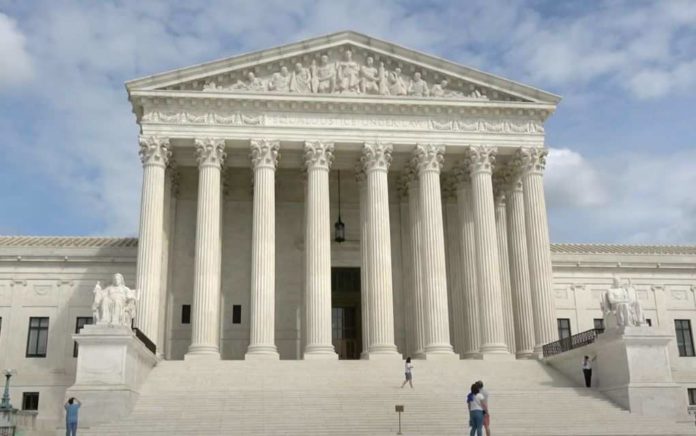
The highest court in the land has a lot on their plate. But this is going to be the biggest thing they’ve seen in years.
And now the Supreme Court was issued one demand from Trump that reshapes America.
In a bold push to secure America’s borders and preserve the integrity of citizenship, the Trump administration has petitioned the Supreme Court to greenlight an executive order ending automatic birthright citizenship for children of illegal immigrants and temporary visitors, framing the move as essential to countering decades of lax immigration policies that have strained national resources.
Challenging Lower Court Blocks on Executive Authority
The administration’s appeal, filed last Friday and first reported by CNN, seeks to overturn rulings from four federal courts that struck down President Trump’s Day One executive order as unconstitutional. Solicitor General D. John Sauer argued that these decisions reflect a “mistaken” interpretation of the 14th Amendment, wrongly extending citizenship to those not fully subject to U.S. jurisdiction. “Those decisions confer, without lawful justification, the privilege of American citizenship on hundreds of thousands of unqualified people,” Mr. Sauer told the justices in the undocketed appeals from New Hampshire and Washington state cases.
This marks the second time this year the issue reaches the high court, following a June ruling that curbed overbroad nationwide injunctions by lower courts— a procedural win for Trump that cleared the path for this substantive challenge.
Conservatives hail the appeal as a critical stand against judicial overreach, insisting the order restores the original intent of the Constitution by excluding children of undocumented entrants and short-term visa holders, much like the longstanding exemption for diplomats’ offspring.
Defending the 14th Amendment’s True Meaning
At the heart of the dispute is the 14th Amendment’s citizenship clause: “All persons born or naturalized in the United States, and subject to the jurisdiction thereof, are citizens of the United States and of the State wherein they reside.”
Trump contends that illegal immigrants and temporary visitors fall outside full “jurisdiction,” rendering their U.S.-born children ineligible for automatic citizenship—a position supporters say addresses a loophole exploited to incentivize illegal border crossings.
Opponents, including the ACLU, invoke the 1898 Wong Kim Ark precedent, which granted citizenship to a child of legal non-citizen residents, claiming it settles the matter. “This executive order is illegal, full stop, and no amount of maneuvering from the administration is going to change that,” said Cody Wofsy, deputy director of the ACLU’s Immigrants’ Rights Project.
Yet, backers of the policy argue Wong Kim Ark doesn’t directly apply to illegal entrants, presenting novel questions ripe for Supreme Court clarification amid what they decry as an immigration crisis fueled by chain migration.
The order directs agencies to withhold recognition of citizenship documents for affected children born after February 19, 2025, bypassing Congress to act decisively on a campaign promise. Critics on the left decry it as a radical rewrite, but conservatives view it as overdue enforcement of sovereignty, potentially averting projections of millions more unauthorized residents by mid-century.
Path to High Court Showdown and Broader Implications
Requiring just four justices to grant review, the petitions urge a merits decision in the 2025-26 term starting October 6, potentially yielding a ruling by summer 2026. In prior proceedings, Justice Sonia Sotomayor warned that upending birthright citizenship would revive the “grievous error” of Dred Scott by eroding the 14th Amendment’s post-Civil War guarantee.
“There it has remained, accepted and respected by Congress, by the Executive, and by this court. Until today,” she wrote, asserting Wong Kim Ark encompasses even undocumented parents.
This fight exemplifies Trump’s resolve to reclaim constitutional fidelity from activist judges and open-borders advocates. The Ninth Circuit’s July affirmation of a nationwide block underscored the stakes, with one judge affirming the order “contradicts the plain language of the Fourteenth Amendment.” Victory at the Supreme Court could redefine citizenship, bolstering border security and curbing what the administration calls a destructive misreading with profound fiscal and cultural costs.


